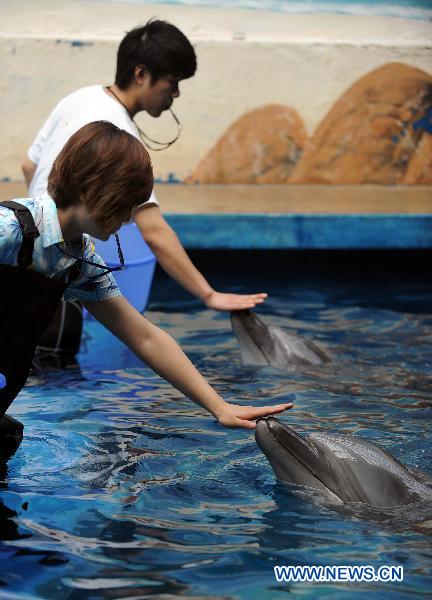 |
|
Animal trainers touch dolphins at an aquarium in Fushun, northeast China's Liaoning Province, July 6, 2010. Dolphins at the aquarium in Fushun are trained to play with autistic children as an assistant therapy when the interactive center of the aquarium is to open in September. (Xinhua/Yao Jianfeng) |
An ocean amusement park in northeast China's Liaoning Province has purchased four dolphins this year, but these dolphins are not intended for amusement, but for treating children suffering from autism, a neural disorder characterized by impaired social interaction and communication as well as repetitive behavior.
The dolphins, brought from Japan in June with five million yuan (738,000 U.S. dollars), began to work with young patients after a month' s adaptation and training, said Chen Rujun, chief inspector of animals at Royal Ocean World (ROW) in Fushun City, Liaoning.
"ROW has provided therapy for autistic children since 2007 when we had three dolphins as 'doctors', treating more than 20 children ranging from 2-years to 10-years-old," Chen said.
Each child would come here 12 times a month, playing with a dolphin as therapy, and the effect would depend on the amount of time for therapy, he said.
A five-year-old boy from Anshan City, who used to be able to only speak a few words, could go to kindergarten and even sing along with songs on TV after a one-and-half-month treatment, Chen told Xinhua.
The treatment used to be free of charge, but there is an emerging demand and ROW is now charging each family 2,000 yuan per month, and less for poor families.
"More than 100 families from Liaoning, Hebei and Tianjin have lined up to make an appointment," said Zhang Yingying, business manager of ROW.
Chen said dolphins emit high-frequency ultrasonic waves which stimulate dormant brain cells in autistic children.
However, such treatment is only an assisted therapy and is not effective for all autistic children.
"Although the effective rate reaches 90 percent, some families still found the treatment without any effect for their children," Chen said.
"There is no scientific proof that dolphin therapy cures autistic people right now, and while it might be helpful for children, little effect has been seen on adults," said Zhang Zhonghe, a professor at Liaoning-based Dalian Medical University.
In addition to Liaoning, dolphin treatment has been used in the ocean parks of other provinces such as Shandong and Guangdong, and business is booming these days during summer vacation.
Editor: Xie Fang
Source: Xinhua